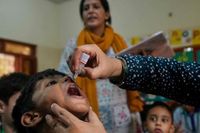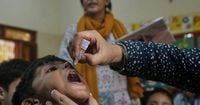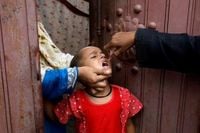On September 29, 2025, health officials in Pakistan confirmed two new cases of poliovirus in the southern province of Sindh. The cases, detected in young girls from the Badin and Thatta districts, have pushed the country’s total for the year to 29, according to the National Institute of Health (NIH) and the Pakistan Polio Eradication Program, as reported by the Associated Press of Pakistan and the AP. This latest development is a sobering reminder of the persistent challenges facing Pakistan’s decades-long battle to eradicate polio.
The new cases in Sindh are particularly concerning for public health officials, as they come despite a series of intensive immunization drives conducted throughout 2025. With these two additions, Sindh’s tally for the year stands at nine cases, while Khyber Pakhtunkhwa has reported 18, and Punjab and Gilgit-Baltistan have each seen one. The virus continues to find vulnerable pockets, especially among children under the age of five, who remain the primary targets for both the disease and the vaccination campaigns.
Polio, a highly infectious and incurable disease, can cause lifelong disability and even death. The only effective protection, health experts stress, is repeated doses of the Oral Polio Vaccine (OPV) for every child under five, along with timely completion of routine immunizations. "Polio is a highly infectious, incurable disease that can cause lifelong paralysis," officials reiterated, emphasizing the urgency of reaching every child in the country.
Earlier in September, the National Emergency Operations Centre for Polio Eradication orchestrated a massive immunization campaign across 88 districts, including the now-affected Badin and Thatta. Nearly 21 million children under five were reached and inoculated during this effort, according to statements from health authorities. The scale of these operations is staggering, but the continued appearance of new cases reveals the depth of the challenge.
The upcoming nationwide polio vaccination drive, scheduled from October 13 to 19, aims to reach an even larger cohort—45.4 million children up to the age of five. In addition to the OPV, Vitamin A supplements will be administered to further bolster children's immunity. Over 400,000 trained and dedicated frontline workers are expected to go door-to-door across the country, a testament to the scale and commitment of Pakistan’s public health apparatus.
However, the fight against polio in Pakistan is not just a medical challenge—it is a social and security battle as well. According to the World Health Organization (WHO), Pakistan and neighboring Afghanistan remain the only two countries where transmission of the wild poliovirus has never been halted. The reasons are complex: some parents still refuse to vaccinate their children due to persistent myths and misinformation, while others live in hard-to-reach areas where health teams struggle to gain access.
Tragically, health workers and those assigned to protect them often find themselves in harm’s way. In February 2025, gunmen killed a police officer who was guarding a vaccination team in Jamrud, a district in Khyber Pakhtunkhwa bordering Afghanistan. Since the 1990s, more than 200 polio workers and police officers have lost their lives in attacks—grim evidence of the dangers faced by those on the front lines of eradication efforts.
Despite these setbacks, Pakistan’s health authorities remain steadfast. Officials have repeatedly stressed that eradicating polio requires a collective effort. While frontline workers play a critical role in delivering vaccines, parents and caregivers must also ensure their children receive polio drops during every campaign. "Polio eradication requires collective responsibility," health officials stated, urging communities, teachers, religious leaders, and the media to support vaccination drives, dispel harmful rumors, and encourage families to do their part.
The global context adds further weight to Pakistan’s struggle. The WHO and its partners launched the Global Polio Eradication Initiative in 1988, inspired by the successful elimination of smallpox in 1980. The initiative has made remarkable progress worldwide, but the goal of a polio-free world remains elusive in Pakistan and Afghanistan. The effort came tantalizingly close in 2021, when only five cases were reported between the two countries. Yet, the virus rebounded, with cases rising to 99 in 2024, and Pakistan now averaging about three new cases each month since January 2025.
Officials and experts are acutely aware of the stakes. The recurring outbreaks threaten not only children in Pakistan but also global eradication efforts. The virus, if left unchecked, can easily cross borders and reignite outbreaks in regions previously declared polio-free. This is not just a local crisis—it is a matter of international concern.
As the October vaccination drive approaches, the focus is on both logistics and trust. Ensuring that 45.4 million children receive their OPV and Vitamin A supplements is a Herculean task, requiring careful coordination, security arrangements, and community engagement. The involvement of over 400,000 frontline workers underscores the seriousness with which Pakistan is approaching this challenge. Their dedication is matched by the hopes of millions of families who want a future free from the threat of polio.
Yet, the path forward is fraught with obstacles. Persistent vaccine hesitancy, fueled by misinformation and conspiracy theories, continues to undermine progress. In some communities, rumors about the safety and purpose of the vaccine spread faster than the virus itself, leading to refusals and missed children. Health officials have called on community leaders, religious figures, and the media to play a proactive role in countering these narratives and building trust in the vaccination process.
Security remains a pressing concern, especially in regions with a history of militant activity. The protection of vaccination teams is paramount, and authorities have pledged to enhance safety measures to prevent further tragedies. The memory of those who have lost their lives in the line of duty serves as a somber reminder of the human cost of this campaign.
Despite the daunting challenges, the resolve among health officials and frontline workers is undiminished. Pakistan’s commitment to eradicating polio is clear, and the upcoming vaccination drive represents another critical opportunity to move closer to that goal. Success, however, will depend on the collective will of the nation—on the ability of communities to come together, support vaccination efforts, and ensure that every child receives the protection they deserve.
With the world watching and the stakes higher than ever, Pakistan stands at a crossroads. The outcome of the October campaign may well determine whether the country can finally turn the tide against polio, securing a healthier future for its children and contributing to a world free from this devastating disease.



